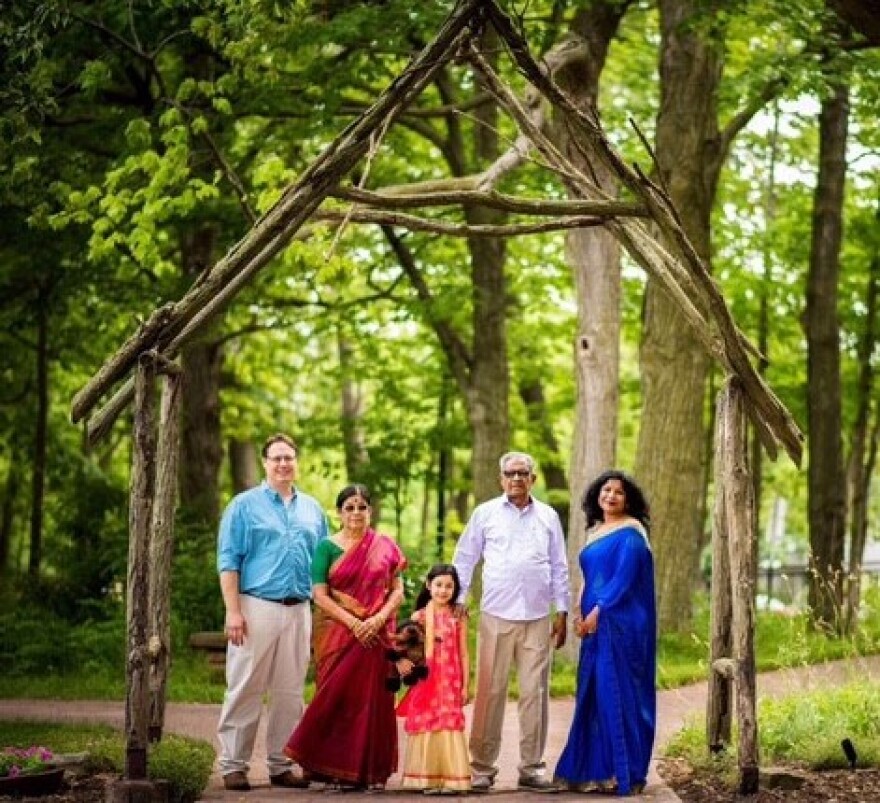COVID-19 caseloads, hospitalizations, and deaths have steadily dropped recently in the United States. As Illinois moves into a full economic reopening, it's easy for some to act like the pandemic is over.
But in India, a major crisis rages on, and Bloomington-Normal's Indian community wants others to pay attention.
India experienced its deadliest peak of the coronavirus last week, when the country recorded more than 6,000 COVID-related deaths in a single day. Another somber global record was daily caseloads above 400,000 infections.
The situation is slowly improving. Bloomington-Normal residents with family in India say it has been exhausting.
Rakesh Chandra and his wife moved to the Twin Cities in 2007. All of their family—parents, siblings, in-laws—are back in India.

"I was literally so scared," Chandra said. "Any phone call I was getting from India, any message, I was thinking the worst. The situation was so, so bad—it’s still really bad. It’s just psychological warfare. You’re playing with it all the time."
Chandra said he and others did what they could to help from afar during the darkest days of India's second wave.
“I was sending medical supplies from here through Amazon and other sites that would still supply to India. Whatever was needed, I tried to take care of from here," Chandra said. "But just the fear that if something happens and they have nowhere to go—there’s no hospital (space), there’s no oxygen, ventilators are at a bare minimum—that thought gives me worry.”
Chandra said he feels like the best thing he can give his family now is hope.
"We’ve been calling our folks back in India at 2-3 times per week, if not every day. That’s the minimum we can do," Chandra said. "Just consoling them and saying, ‘Just like any passing thing, this will be over. You just have to hunker down, you just have to hang on … Watch some comedy movies, read some good books—just learn how to be happy inside without getting frustrated.' It’s easier said than done.”
Chandra said many of his friends are in the same boat: trying to look after aging loved ones more than 7,000 miles away. One friend traveled to India to care for their parents, contracted COVID while there, and died.
Others were able to see their family back home before COVID infections ramped up.
Ravi Singhal went to India in March after his dad died—not from the coronavirus. That was just before the the outbreak peaked.
Singhal's family lives in the capitol of New Delhi that has born the brunt of India's infections.
"My mom and brother, they’ve essentially for the last six weeks so … they have not stepped out of the boundaries of the subdivision where they live," Singhal said. "My brother and his wife did contract COVID, but they did not require hospitalization. They were able to just self-quarantine, stay at home, and they’re now almost recovered fully.”
Singhal said all of his family has now taken the vaccine. He said they're fortunate: Just 6.2% of India's population is fully-vaccinated. That's compared to 43.8% in the U.S.
Singhal said he'd like to see more global aid for India.
“I think the biggest thing is—and the U.S. is doing some of it—is getting vaccine to the people of India. I think, initially, the U.S. was donating a few million doses. But with the vast population of India— 1.3 billion people, I believe is the number—we need a lot more from the U.S. and other countries," Singhal said.
The Biden administration is buying 500 million doses of the Pfizer vaccine to distribute around the world. That's on top of a promise to donate 75% of the U.S.'s unused vaccine doses to the United Nations-backed COVAX global vaccine sharing program.
Singhal said he'd also like to see travel restrictions revisited for fully-vaccinated residents, like his mom. She wanted to come to the U.S. to be with her son after her husband's passing, but currently isn't able to leave India.

Punitha McCormick is in a nearly identical situation. She was supposed to go see her family in March 2020, but then COVID hit.
“I had to cancel my flight. Then December, I lost my dad and I wasn't able to go . It was really hard trying to—as he was starting to get sick— trying to see, 'How can we get an emergency visa? How can I travel?' Unfortunately I couldn't make it there in time.”
Like Ravi Singhal, McCormick's dad died from non-COVID causes. But the pandemic made traveling to be with family extremely difficult. Travel restrictions were changing constantly. Calls to the Indian Embassy for help with passports and visa applications went unanswered. Demand overwhelmed lines of communication.
McCormick said a group of friends who faced similar challenges formed a group, McLean County Indian Community Cares, to help fellow Bloomington-Normal residents in need.
“We just got together trying to come up with a solution because so many people were trying to figure out this whole travel situation, disease situation—trying to figure out: 'Can I go? Is the embassy even open? What documents do I need?' Things like this that are so stressful," McCormick said. "We're just trying to help one another."
The group is piloting a virtual "help desk" to connect people with resources.
McCormick said one way the Bloomington-Normal community at large can help is by being there for their Indian neighbors.
“Every house literally has known someone that has been impacted—the same as over here. And with that, I would say not to judge, but just to show empathy and to be supportive."
Others urge caution as the U.S. starts to "return to normal." The COVID pandemic isn't over until it's over everywhere.


